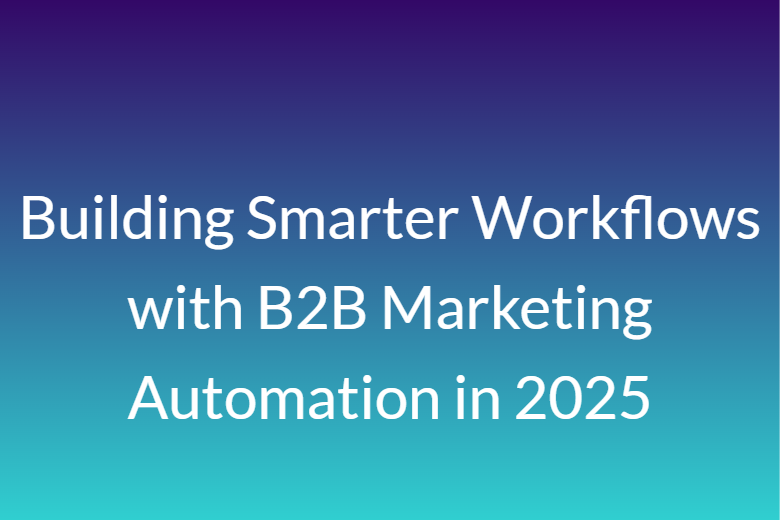Why Workflow Automation is the Backbone of B2B Marketing
As marketing becomes more data-driven and buyer-centric, creating workflows that can adapt to real-time behaviors is no longer optional. B2B Marketing Automation is the foundation that supports this shift. It helps marketing teams build intelligent, automated workflows that respond to audience actions, distribute content strategically, and trigger relevant touchpoints at scale. Whether it’s onboarding new leads, nurturing them through a funnel, or reactivating dormant contacts, workflow automation ensures that every step is accounted for with minimal manual intervention.
Intelligent Routing to Optimize Lead Engagement
B2B Marketing Automation tools in 2025 are more intelligent and context-aware than ever. One of the critical enhancements is lead routing based on dynamic scoring models and behavioral insights. Leads that reach a certain engagement threshold can be automatically routed to the right sales representative based on territory, product interest, or buyer persona. This ensures timely outreach and context-driven communication. Intelligent routing minimizes response delays and maximizes engagement while helping sales teams focus on qualified opportunities instead of chasing cold leads.
Seamless Integration Across Tech Stack
Most B2B organizations use multiple platforms—from CRMs to CMSs to advertising dashboards. B2B Marketing Automation solutions are designed to integrate seamlessly with the entire tech stack. Whether syncing Salesforce data, pulling webinar registrations from Zoom, or pushing engagement signals to Slack, these platforms serve as centralized hubs that unify marketing operations. Seamless integration reduces data silos, eliminates duplicate efforts, and allows the marketing team to operate with greater visibility and control across campaigns.
Adaptive Drip Campaigns That Respond to Behavior
Unlike static email sequences, adaptive drip campaigns respond to how leads interact with your messaging. If a lead clicks a CTA or downloads a guide, their journey adapts—moving them forward with more relevant follow-ups. B2B Marketing Automation platforms track these micro-engagements and use them to alter the frequency, format, and content of communications. For instance, highly engaged users may receive more in-depth assets like case studies or demo invites, while less engaged leads receive educational nurture content. These adaptive drips improve conversion efficiency across segments.
Progressive Profiling to Enrich Lead Data
Getting complete lead data from a single form fill is difficult. B2B Marketing Automation addresses this challenge through progressive profiling, which asks for new information over time during repeat visits or interactions. The first form may only request an email and name, while subsequent forms ask about company size, job title, and pain points. This non-invasive method builds rich lead profiles without causing form fatigue. With more detailed data collected gradually, marketers can further personalize campaigns and improve lead qualification accuracy.
Real-Time Personalization for Web Experiences
Website personalization plays a major role in capturing and converting B2B visitors. B2B Marketing Automation tools enable real-time personalization based on CRM data, past behavior, geolocation, or referral source. A returning prospect from the tech industry might see different content blocks, CTAs, or testimonials than a first-time visitor from healthcare. These subtle yet powerful changes create a tailored user journey that feels highly relevant, helping reduce bounce rates and increase engagement across your digital properties.
Trigger-Based SMS and Social Campaigns
While email remains dominant, modern B2B Marketing Automation incorporates SMS and social automation for multi-channel impact. Marketers can trigger text messages for urgent updates—such as webinar reminders or product announcements—and integrate automation workflows with LinkedIn or X (formerly Twitter) ad sequences. When a lead interacts with a campaign email, automation tools can retarget them on social platforms, reinforcing your message across channels. This creates a synchronized and always-on marketing experience that maximizes visibility.
Automated Sales Enablement Tools
Automation isn’t just for marketers—sales teams benefit too. B2B Marketing Automation platforms automatically equip sales with tailored enablement materials when leads hit specific stages. For example, once a prospect hits a lead score of 80, the system can generate and send a personalized sales deck, case study, or pricing sheet to the rep. This proactive enablement reduces manual back-and-forth and ensures that sales teams have the right assets at the right time to convert leads effectively.
Automating Customer Feedback Loops
In 2025, feedback is currency. B2B Marketing Automation platforms now automate post-sale surveys, satisfaction polls, and referral requests. These workflows can be triggered after onboarding completion, purchase, or support interaction. Responses can be analyzed to adjust future nurture strategies or alert customer success teams about at-risk accounts. Automating feedback loops provides ongoing insight into customer sentiment and strengthens post-sale relationships, which can lead to upsells, renewals, and positive word-of-mouth.
Lifecycle Marketing with Long-Term ROI Impact
One of the greatest advantages of B2B Marketing Automation is its ability to support the full customer lifecycle—from lead to loyal advocate. Automated workflows handle top-of-funnel awareness campaigns, mid-funnel education, late-stage decision support, and post-sale engagement. This continuity ensures that messaging is relevant across the customer journey. Lifecycle marketing allows companies to optimize touchpoints at every stage and create long-term strategies that drive sustainable B2B growth, customer satisfaction, and ultimately, ROI.
Read the Full Blog Now @ https://acceligize.com/featured-blogs/what-is-b2b-marketing-automation-and-why-it-matters-in-2025/
About Us
Acceligize is a global B2B lead generation and demand generation company, helping enterprises scale their revenue pipeline through intent-based marketing, content syndication, and integrated media solutions. Leveraging advanced targeting technologies and omnichannel strategies, Acceligize enables businesses to reach their ideal buyers with precision and at scale. Our mission is to deliver high-quality, marketing-qualified leads that drive measurable ROI. With our expertise in B2B webinar lead generation and beyond, we help companies connect with decision-makers and move prospects faster through the buyer journey.
